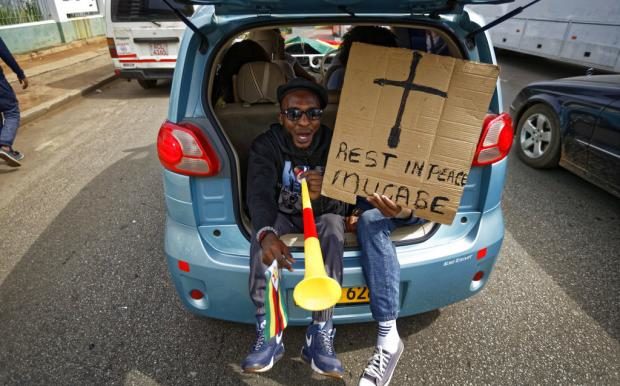
Protesters demanding President Robert Mugabe stand down ride in the back of a car with a placard “Rest in peace Mugabe” as they drive towards State House in Harare, Zimbabwe Saturday, Nov. 18, 2017. In a euphoric gathering that just days ago would have drawn a police crackdown, crowds marched through Zimbabwe’s capital on Saturday to demand the departure of Mugabe, one of Africa’s last remaining liberation leaders, after nearly four decades in power. (Photo by BEN CURTIS / AP)
HARARE, Zimbabwe — Clinging to his now virtually powerless post, longtime Zimbabwe President Robert Mugabe on Sunday was set to discuss his expected exit with the army commander who put him under house arrest, while the ruling party prepared to recall the world’s oldest head of state as its leader.
A day after huge crowds rallied peacefully in the capital, Harare, for the 93-year-old Mugabe to go, the ruling party’s Central Committee was gathering to meet Sunday on demands by provincial branches to recall him. It also was expected to reinstate the vice president whose firing nearly two weeks ago led the military to step in, and recall the unpopular first lady as head of the women’s league.
That former vice president, Emmerson Mnangagwa, is expected to lead a new government. Without the military’s intervention, first lady Grace Mugabe likely would have replaced him as vice president and been in a position to succeed her husband.
Impeaching the president is another step when Parliament resumes Tuesday, and lawmakers will “definitely” put the process in motion, the main opposition’s parliamentary chief whip told The Associated Press.
Innocent Gonese with the MDC-T party said they had been in discussions with the ruling ZANU-PF party to act jointly.
“If Mugabe is not gone by Tuesday, then as sure as the sun rises from the east, impeachment process will kick in,” Gonese said. The MDC-T has unsuccessfully tried to impeach Mugabe in the past.
Mugabe’s talks with army commander Constantino Chiwenga are the second round of negotiations on an exit with a veneer of dignity as the military tries to avoid accusations of a coup. The discussions come ahead of a key ruling party congress next month, as well as scheduled elections next year. Mugabe is said to be asking for more time.
Sunday’s negotiations do not appear to include the South African government delegation that took part in the first round. South Africa’s president on Saturday said talks are in “early days.” The southern African regional bloc will hold a four-country summit in Angola on Tuesday to discuss the Zimbabwe situation.
Mugabe finds himself increasingly isolated under house arrest in his lavish Blue Roof mansion, deserted by most of his allies, with others arrested.
On Saturday, most of Harare’s population poured into the streets in an anti-Mugabe demonstration that just days ago would have brought a police crackdown.
They clambered onto tanks moving slowly through the crowds, danced around soldiers and surged in the thousands toward the State House building where Mugabe held official functions, a symbol of the rule of the man who took power after independence from white minority rule in 1980.
The euphoria came after years of watching the once-prosperous African nation fall into decay, with a collapsing economy, repression of free speech, disputed elections and international sanctions.
Even as concerns remained about who next would be in charge and what freedoms might be available if the military lingers in power – or if Mnangagwa succeeds his longtime ally Mugabe as leader – people reveled in the rare chance to express themselves freely.
Let us have this moment, Zimbabweans said. If the next leader becomes trouble, they vowed to return to the streets again.